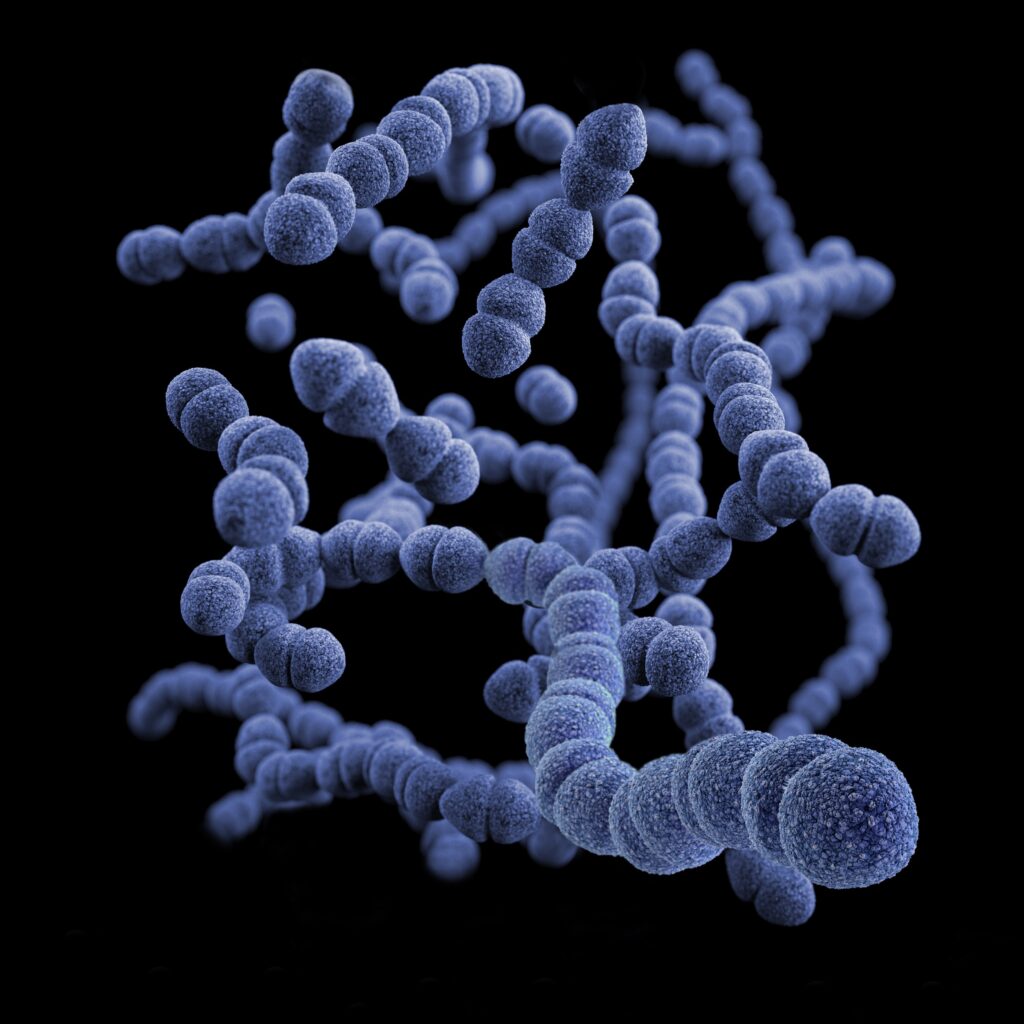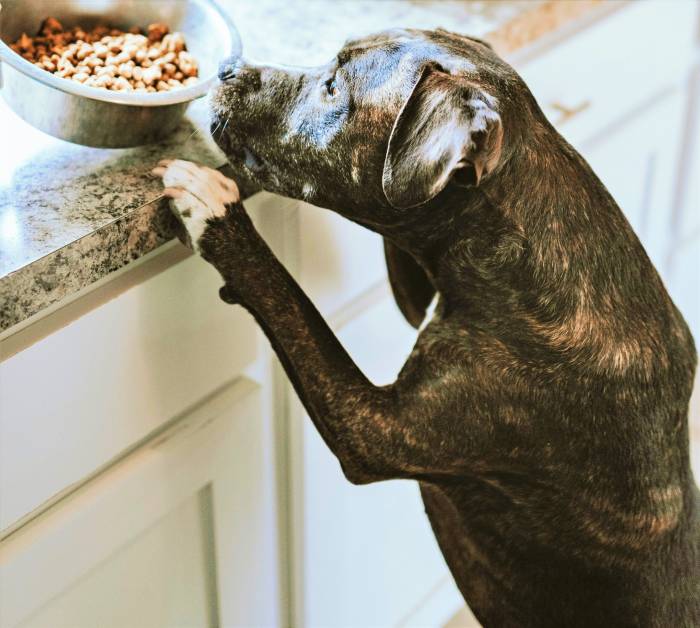Prebiotics play a crucial role in promoting healthy bacteria and supporting the microbiome as a whole. And a thriving microbiome is absolutely vital for your four-legger to live a long, vibrant life.
But the microbiome is so often overlooked when pet parents are thinking about their dog’s health.
Pet parents notice the shiny coat (cue the oohs and ahhs).
The frisbee-related athleticism (12 out of 10).
And the minty fresh breath (which is actually a lot easier than you think).
These are all important pieces of your dog’s health, but what’s going on inside your dog’s body? Health is more than skin deep. In fact, one of the most important systems in your dog’s entire body is the microbiome. You can’t see it directly how you can that shiny coat, but that doesn’t mean it’s any less important. On the contrary, it is absolutely vital.

The microbiome is made up of trillions of microorganisms (bacteria, fungus, viruses, and more) inside our bodies. It’s known as the forgotten organ — and it’s massively underappreciated!

It impacts everything from your risk of cancer to brain health to happiness (not kidding). It’s closely related to gut health, obesity, and autoimmune diseases. It even impacts allergies! And, maybe most importantly, it helps keep the immune system running smoothly, which is crucial for long-term health and wellness. It’s seriously a huge deal — and you should absolutely consider it as you make choices for your dog’s (and your) health.
The health of those trillions of microorganisms starts with what’s in the bowl. This is exciting news because it means you, dear reader, have the power to provide your dog with the tools to live a healthy, vibrant life.
So what exactly should be in that bowl?
Well, this is where prebiotics come in.
There is an intimate connection between the microbiome, gut health, and prebiotics.
And we’re about to cover it all! Pretty soon, you’ll be joining the microbiome cheerleading squad (seriously, we have chants).
On The Agenda
What Are Prebiotics
Prebiotics are long-chained sugars that feed bacteria within the microbiome.
Wait — feed bacteria? Yep. Many people immediately assume bacteria are always bad and cause havoc. But the truth is that not all bacteria are bad.
We also have good bacteria in our bodies that compete with bad bacteria and keep us healthy — in fact, the good bacteria are vital for our health.
So these are the bacteria we want the prebiotics to feed.

The Relationship Between Prebiotics & Probiotics
Probiotics are a fantastic example of beneficial bacteria — they are absolutely the good guys. As far as we’re concerned, they’re wearing lil’ superhero capes. You want probiotics on your team.
Probiotics are live microorganisms found in fermented foods like yogurt, kefir, and many supplements. Yes, we eat them. And once we do, they can go to work in our guts.
Now. Let’s bring back the prebiotics. The prebiotics feed the probiotics (think of prebiotics as a nutritious lil’ snack for our lil’ cape-wearing probiotics). Prebiotics help our bodies absorb nutrients, keep the gut functioning well, and give the probiotics a boost. Without prebiotics, the probiotics wouldn’t be able to thrive and do what they do best — support gut health, the microbiome, and the immune system.
The reason prebiotics are so important is because they help create a competitive environment for good and bad bacteria. Balance is the name of the game.

If there are too many prebiotics, then the bad bacteria are also fed (because there are plenty of lil’ snacks to go around).
On the other hand, not enough prebiotics means that the good bacteria aren’t being fed (not enough lil’ snacks) and therefore can’t make it through the GI tract and down to the colon — which you can think of as the central hub for microbiome health. If the probiotics can’t make it to the colon, then the microbiome and immune system won’t truly thrive.
Whew. A lot is riding on this nutritious lil’ snack called the prebiotic.
The Vitality Of The Microbiome
If you couldn’t tell already, we think the microbiome is kind of a BIG-FREAKING-DEAL. It plays a leading role in your dog’s health. From development to digestion to disease, the microbiome is involved.
Like we mentioned above, it’s composed of trillions of microorganisms that live in our bodies — particularly in the gut (ahem, see the connection?). These communities aren’t invaders but rather, a complex and vital system that helps keep the body functioning.
And here’s the really important part: upwards of 80% of the immune system is linked to gut health and the microbiome.
This is tremendous — because we know that a healthy immune system means the ability to fight disease.
And all of this can be traced all the way back to those prebiotics.
- Without prebiotics, probiotics won’t thrive.
- Without probiotics, the gut won’t thrive.
- Without a thriving gut, the microbiome won’t thrive.
- Without a thriving microbiome, the immune system won’t thrive.
- And without a thriving immune system, the body is more vulnerable to disease.
This chain goes all the way back to that humble prebiotic, so don’t underestimate it! Prebiotics are an absolutely crucial addition as you take a proactive approach to your dog’s health.

How To Boost Your Dog’s Gut Health
It all starts with what’s in your dog’s bowl.
Our answer is almost always real, whole food (learn more about what your dog needs with “What Makes A Carnivore”). Real, whole food provides your dog with the nutrition she needs to thrive — from protein-rich skeletal and organ meat to antioxidant-rich superfoods. So it is safe to say we are Team Real Food (yes, we have a cheerleading squad for that too).
But is whole food nutrition enough in this situation?
Sometimes, real food isn’t able to provide enough vital nutrients like probiotics. It’s also difficult to achieve the proper balance of prebiotics and probiotics with whole food alone (and remember: the balance is delicate and vital).
So when you’re looking at giving your dog probiotics and prebiotics, it’s important to make choices that provide the appropriate balance — rather than just a splash of kefir here and there (since it doesn’t provide enough probiotics or the proper balance of probiotics and prebiotics).
This is a situation where you should take it a step beyond real, whole food.
Ensure that your dog is getting appropriate levels and the ideal balance of probiotics and prebiotics by adding all-in-one support for gut and microbiome health.
So yes, add a splash of kefir here and there (we’re here for it!), but also pair it with a more balanced source of prebiotics and probiotics.
Now is the perfect time to start taking steps to support your dog’s gut health, microbiome, and immune system. So don’t forget these lil’ guys — these prebiotics that do so much for probiotics and your dog’s health from the inside out!
Share this Post

Dr. Chris Besent
Chris Bessent, DVM, MSOM, Dipl. OM, L.Ac. has over thirty years of experience in veterinary medicine including certificates in veterinary acupuncture, veterinary chiropractic and veterinary Chinese herbology. Imbued with Eastern philosophy and the knowledge that food is the foundation of health, Dr. Bessent also received her degree in veterinary nutrition and began to formulate recipes fit for a carnivore from nothing but whole foods. Currently, she divides her time between the Simple Food Project and Herbsmith, both of which are owned and operated out of her facilities in southeastern Wisconsin.

Hayley Zablotsky - Writer
Hayley is a freelance writer based in Northern California. (Writing for Herbsmith is her favorite, but don't spread it around.) She enjoys riding horses, taking road trips, and eating grilled cheese sandwiches. Her foster dogs have mixed feelings about the spinach she keeps trying to sneak into their bowls.

Kayla Behling - Editor
Kayla is the Content Editor for Herbsmith. She has a cat named Professor Cat-Faced Meowmers, who goes by Kitty, and a goof of a dog, named Duck. She stays busy biking trails, playing board games, and searching for the next best craft beer.




